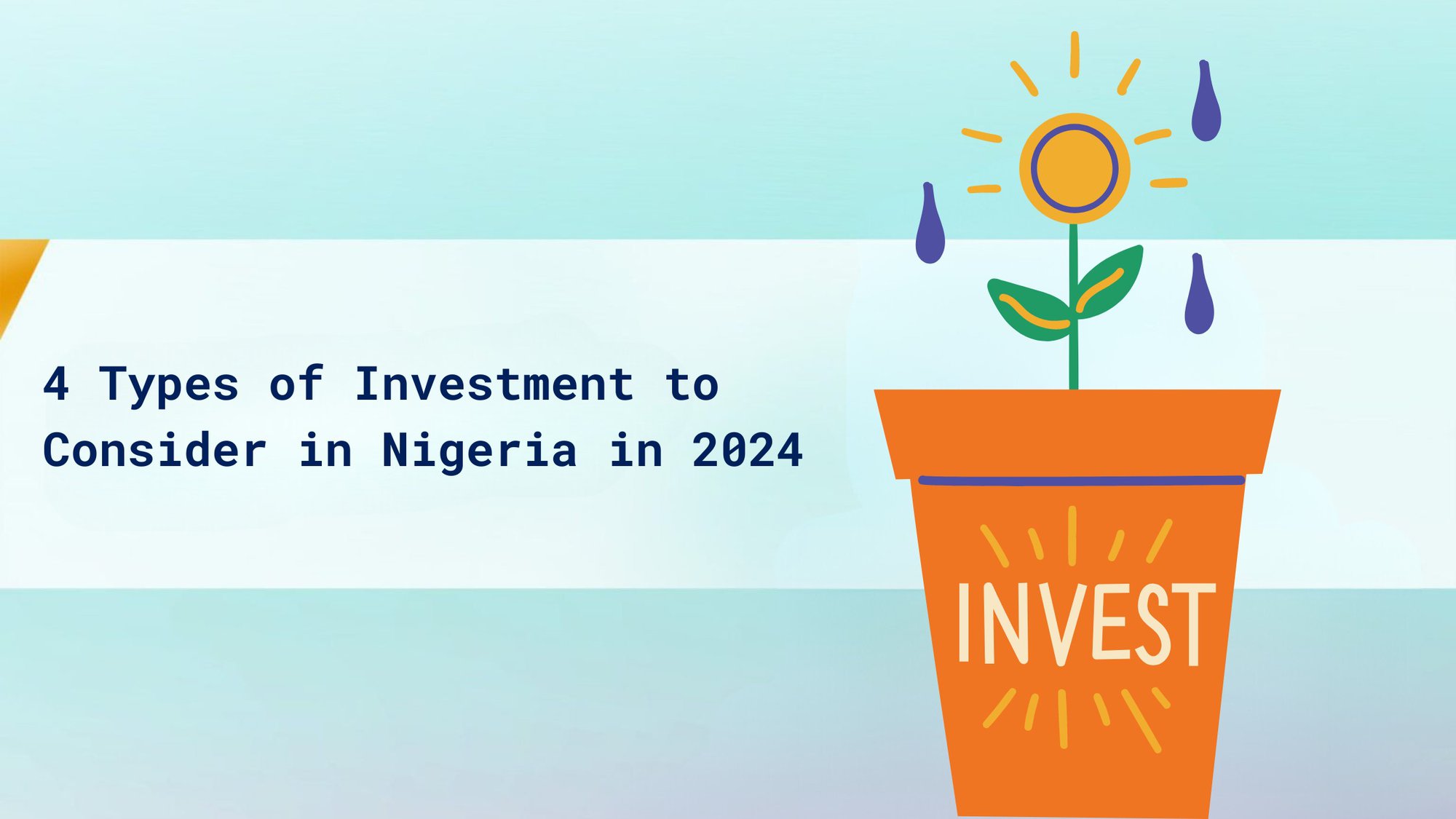
4 Types of Investment to Consider in Nigeria in 2024
Author Taiwo Temitope-Adesope
Nigeria's investment landscape is constantly evolving, and it is essential to diversify your portfolio to maximize returns. With the Nigerian economy projected to grow at a steady pace, investors are looking for lucrative opportunities to invest their money. In 2024, there are four types of investments for you to consider in Nigeria 2024.
The first type of investment to consider in 2024 is real estate. The Nigerian real estate market continues to attract investors due to rapid urbanization and population growth. With the demand for housing on the rise, investing in real estate can be a profitable venture. Additionally, the government's focus on affordable housing initiatives presents a unique opportunity for investors to tap into the affordable housing market.
The second type of investment to consider is renewable energy. As the world moves towards sustainable energy, Nigeria is no exception. The country has abundant renewable energy resources, including solar, wind, and hydropower. Area investors can easily explore with potential for high ROI, including solar power, wind energy, hydropower, biomass, and energy storage solutions. The government's push towards renewable energy also presents a unique opportunity for investors to take advantage of the growing demand for clean energy.
Fixed Income Instruments
Fixed income instruments are investment vehicles that provide a fixed return on investment over a period of time. They are ideal for investors who prefer steady income streams with low risk. In Nigeria, fixed-income instruments come in various forms such as government bonds, corporate bonds, and treasury bills.
Government Bonds
Government bonds are fixed-income securities issued by the Nigerian government. They are considered low-risk investments because they are backed by the full faith and credit of the government. The bonds come in different maturities, ranging from 2 to 30 years. The longer the maturity, the higher the potential return. However, longer maturities also come with higher risks. Investors should conduct thorough research to understand the market risks before investing.
Corporate Bonds
Corporate bonds are fixed-income securities issued by companies in Nigeria. They are riskier than government bonds because they are not backed by the government. The risk of default is higher, but so is the potential return. Corporate bonds come in different maturities and credit ratings. High credit ratings indicate a lower risk of default and vice versa. Investors should conduct thorough research on the creditworthiness of the company before investing in corporate bonds.
Overall, fixed income instruments are suitable for investors who seek steady income streams with low risk. However, investors should conduct thorough research to understand the market risks before investing.
Looking to invest in Fixed Income funds and don’t know where to start? Start by comparing on nairaCompare!
With nairaCompare, you can:
- Compare Fixed Income funds side-by-side: Find the best rates, returns, and maturities to match your needs.
- Filter and sort based on your preferences: You can filter based on your investment amount and risk level.
- Apply directly for your chosen fund: Skip the hassle and save valuable time.
- Don't settle for the first fund you find. Compare and invest smarter with nairaCompare!

Equity Investments
Equity investments are one of the most common types of investment in Nigeria. They involve buying shares of ownership in a company. Equity investments can be high risk, but they also offer the potential for high returns.
Nigerian Stocks
Investing in Nigerian stocks can be a great way to get started with equity investments. The Nigerian Stock Exchange (NSE) has been performing well and has shown consistent growth in recent years. However, it's important to remember that stock prices can be volatile and subject to market risks. Thorough research and understanding of the market risks are crucial before investing in Nigerian stocks.
Fractional Shares
These shares are a relatively new concept in Nigeria, but they are gaining popularity. Fractional shares allow investors to buy a portion of a stock instead of the whole stock. This makes it easier for investors to diversify their portfolios and invest in multiple companies with smaller amounts of money. Fractional shares also come with lower transaction costs and lower risks compared to buying whole stocks.
Overall, equity investments are a great way to invest in Nigeria's growing economy. However, investors should be aware of the high risks involved and conduct thorough research before investing.
Real Estate Investment Trusts (REITs)
Real Estate Investment Trusts (REITs) are an alternative way to invest in real estate without direct ownership. REITs pool funds from multiple investors to purchase and manage income-generating properties such as office buildings, apartments, hotels, and shopping centers.
REITs offer the potential for stable income and capital appreciation as they distribute most of their taxable income to shareholders as dividends. Additionally, the value of REIT shares may increase over time as the underlying properties appreciate.
In Nigeria, there are several REITs listed on the Nigerian Stock Exchange (NSE), including UPDC REIT, Sky Shelter Fund, and Union Homes REIT. Investors can also consider fractional REIT options, which allow for smaller investments in REITs.
Overall, REITs can be a viable option for Nigerian investors looking to diversify their portfolios and invest in real estate without direct ownership.
Commodities
Investing in commodities like oil, gas, and agriculture can be a high-risk, high-reward strategy for Nigerian investors. These markets are inherently volatile, and prices can fluctuate rapidly due to global supply and demand dynamics. However, the potential for significant returns is also present, especially in the case of oil, which is an essential global commodity.
Direct investment options in commodity markets may be limited, but there are alternative routes to consider. Commodity-linked funds, for example, can provide exposure to commodity markets without the need for direct investment.
It is important to note that investing in commodities requires a deep understanding of market dynamics and a willingness to take on significant risk. Potential investors should carefully consider their investment goals and risk tolerance before entering this market.
Conclusion
Nigeria has a diverse investment landscape with various opportunities for investors to consider. From the booming technology sector to the thriving agriculture and renewable energy industries, there are options for investors with varying risk tolerances and investment goals.
To make informed investment decisions, it is essential to conduct thorough research and understand one's risk tolerance. Investors should also consider seeking professional advice before making any investment decisions.
In summary, the four types of investment to consider in Nigeria in 2024 are Real Estate, Agriculture, Technology, and Renewable Energy. Each of these sectors has its unique opportunities and challenges that investors should carefully evaluate before investing.
Investors should take a responsible approach to investment decisions and explore further investment opportunities in Nigeria. With the right approach and mindset, investing in Nigeria can be a profitable venture for investors.
About Author

Taiwo Temitope-Adesope
Taiwo is a passionate storyteller and strategist dedicated to empowering women and crafting compelling narratives. A First-Class graduate in Mass Communication from Covenant University, she specializes in writing, public relations, and digital marketing. As a Content Manager at Suretree, she drove a 50% increase in web traffic through SEO and boosted website engagement by 60% in just four months. Her leadership experience includes serving as Public Relations Officer for the Covenant University Student Council and contributing to impactful volunteer initiatives. With expertise in strategic thinking and business acumen, Taiwo continues to create stories that inspire confidence and imagination.
.png?width=1615&height=444&name=nairaCompare%20Christmas%20logo%20(PNG).png)








